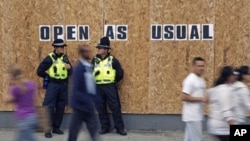London was largely calm Wednesday, but the rioting that engulfed the British capital for the past four nights has spread to other cities, including Manchester and Birmingham. British Prime Minister David Cameron authorized police to use water cannons, which is a first for the British mainland, saying a "fightback" is under way to restore law and order to Britain's streets.
Observers say the rioting was not based on specific political or economic demands, but they acknowledge there are underlying reasons that so many young people are willing to take part in looting, arson and vandalism - on a scale the country has not seen in many years.
In London and other British cities, young people burned cars and buildings, looted stores and fought with police.
The riots broke out after a still-unresolved shooting by police in a poor North London neighborhood. However, that was just the spark. Many Londoners initially assumed the violence was a backlash from chronic unemployment, slow economic recovery and cuts to public service spending by the country’s new government.
But there were no slogans, no chanting, no demands. And it soon became clear to many that this was something different.
Geography Professor Chris Hamnett, of King’s College, lives in North London, not far from some of the worst rioting.
"Essentially, what we've seen is rioting for fun and profit. This is not people expressing their anger against an oppressive state," said Hamnett. This is people thinking it would be nice to get a slice of the action.”
The riots were concentrated in neighborhoods with large African and Caribbean populations, which have a history of tension with the police. Hamnett said those Londoners generally have less education, more unemployment and higher crime rates than other Britons.
“There’s a racial dimension to the rioting and the looting, but it’s not one of racial oppression. But there is undoubtedly a quite strong class and economic element,” said Hamnett.
Not far from the professor’s house, police stood guard as crews worked to clean up the damage from the previous night’s rioting. Basani Mabyalane lives in the neighborhood.
“I feel there is maybe more that could be done to empower the young people because, from what I saw yesterday, to me it looked like they don’t have much to do," said Mabyalane. "They have got the time. They have got the energy. But they are using that energy on negative things.”
In the North London neighborhood of Haringey, some young people are trying to do something positive, through a group called HYPE - "Haringey’s Young People Empowered." One of them is Erica Lopez.
"To be honest, I think at the moment it’s mainly to do with looting. A majority of people are just looting to loot, with no reason, just because they want to do it. Simple as that,” said Lopez.
Lopez said she does not condone the violence, but understands and shares the pent up anger many of her young neighbors feel about a lack of job opportunities and cuts in government funding to youth services.
“The government really needs to actually take time and listen to these young people because for a long time they have been crying in silence saying, ‘This is what matters to me.’ They have really been crying for a long time," she said.
But on Wednesday, after cutting short his vacation, meeting with police officers and chairing two emergency government meetings to deal with the unrest, the British prime minister was not showing any sympathy toward those who engaged in violence and looting. Cameron attributed the unrest to selfishness, lack of responsibility, poor discipline in schools and bad parenting.
“It is all too clear that we have a big problem with gangs in our country. For too long there's been a lack of focus and a complete lack of respect shown by these groups of thugs. I'm clear that they are in no way representative of the vast majority of young people in our country, who despise them, frankly, as much as the rest of us do. But there are pockets of our society that are not just broken, but frankly sick.”
Cameron promised tougher police tactics, harsh punishment for those convicted of crimes during the riots, and that looters caught on film, whose pictures have been published online and in British newspapers, would be arrested and prosecuted.
Officials are determined to regain control, regardless of the reasons for the violence.




